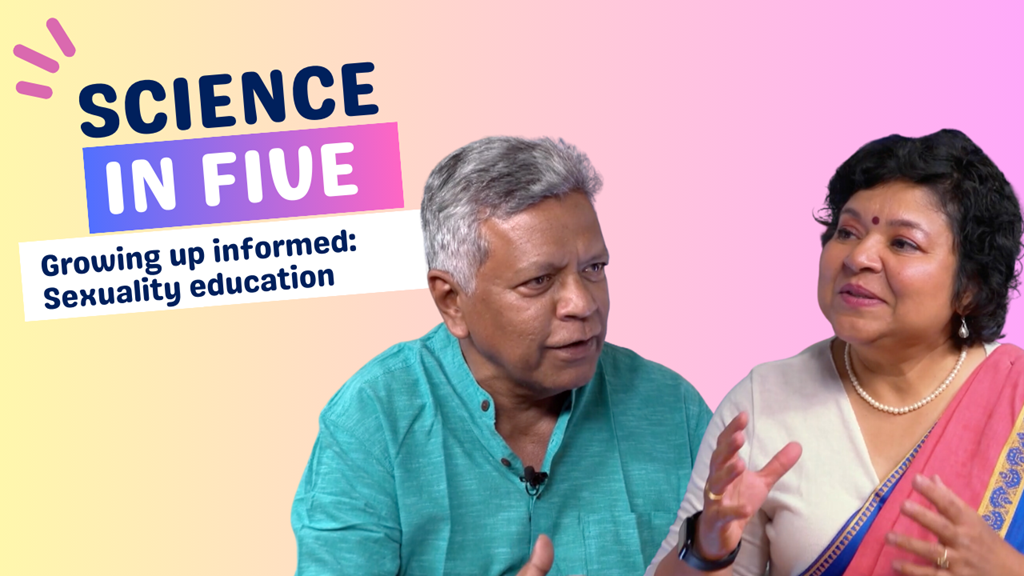Episode #105 - Growing up informed: sexuality education
Alternative media
Related links
Transcript
VGS Why is sexuality education important for our overall health? When, how, and by whom should it be provided? If you've grappled with these questions as a parent, a teacher, a grown up or a young person, Dr. Venkatraman Chandra Mouli, here with some answers. Welcome, Chandra. Chandra, talk to us about why sexuality education is important.
VCM Thank you Vismita. To answer your question, let me talk about what a nine year old girl needs every day to go to school and to come home safely. She needs information and skills and when, where and how to cross the road. She needs a safe and supportive environment. A pedestrian crossing, traffic lights that work, drivers who respect the rules or are punished if they don't respect those rules or an adult to help across the road if the traffic is chaotic.
She may need health and counseling services if she is struck as she's crossing the road. So children and adolescents need this package of actions to cross the road every day to go to school and come home safely and with growing autonomy. They need similar packages of actions for other health issues, including sexual and reproductive health. And that's really what sexuality education is about.
It aims to improve knowledge and understanding. It aims to improve positive and pro-social attitudes and norms. So overall, sexuality education is intended to prepare children and adolescents for the sexual and reproductive lives. Healthy lives and satisfying and happy lives as well. But the sad reality in many parts of the world is that children and adolescents don't get the sexuality education they need and the consequences of that are apparent.
Adolescents are unaware about the changes in their bodies and minds at the time of puberty. Many adolescents are unprepared to avoid sexually transmitted infections or pregnancies when they start to have sexual activity. Adolescent cannot get sexuality education from a parent, teacher or another adult. On the other hand, they can get misinformation from friends, from the media and from social media.
It's easier to get hardcore pornography than a clear answer from a parent.
VGS So Chandra, you've convinced me that sexuality education is important, but what is the evidence that it actually contributes to overall health?
VCM A synthesis of 64 studies of school based sexuality education programs showed that students who had received sexuality education were significantly more likely to have higher levels of knowledge and understanding about HIV, higher levels of self-efficacy to refuse unwanted sex, higher levels of condom use when they had sex. Lower numbers of sexual partners and delayed sexual initiation.
So clearly there are benefits. Is there any evidence to sexuality education in fact harms children and adolescents? A synthesis of 87 studies sought to answer three questions. Does sexuality education lead to early sexual activity, to more sexual partners, to more sexual risk taking? And not one study showed that it contributed to early initiation. A survey in 2017 in the Netherlands showed that students who had experienced sexuality education reported that they were much less likely to have sex early between the ages of 12 and 14 than their counterparts five years ago.
Moreover, they reported that they were much more likely to use contraceptives when they first had sex, much less likely to have coerce sex. The evidence is very clear. Sexuality education is affected. Period.
VGS So, Chandra, talk to us about when, how and by whom should sexuality education be provided?
VCM Sexuality education should begin early. It should be provided on an ongoing basis, not a one off. It should take into account age, development. And of course, it should be cognizant of the social and cultural context. But that doesn't mean it should be watered down. For a five year old it can mean teaching them about the names of body parts, including the genitals, without hesitation and without shame.
For nine and ten year olds, it could mean teaching them about puberty changes in their bodies and minds. And for 15 year olds, it could mean teaching them how to avoid sexual and reproductive health problems when they start having sexual activity. And for all ages, what is very important is to teach them that it is extremely important to respect the choices and decisions of others and to insist that others respect their choices - consent.
And that's something we have to begin very early. Sexuality education should be provided with proven evidence based criteria, and ideally it should be delivered at home, at school and elsewhere in the community. There's a wonderful African proverb which captures this idea - It takes a village to raise a child.
VGS Thank you, Chandra. There you have it. That was Science in 5 today. Until next time then stay safe, stay healthy and stick with science.



